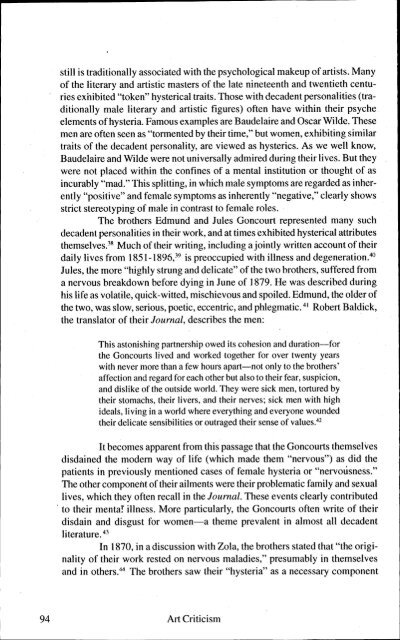Art Criticism - The State University of New York
Art Criticism - The State University of New York
Art Criticism - The State University of New York
Create successful ePaper yourself
Turn your PDF publications into a flip-book with our unique Google optimized e-Paper software.
still is traditionally associated with the psychological makeup <strong>of</strong> artists. Many<br />
<strong>of</strong> the literary and artistic masters <strong>of</strong> the late nineteenth and twentieth centuries<br />
exhibited "token" hysterical traits. Those with decadent personalities (traditionally<br />
male literary and artistic figures) <strong>of</strong>ten have within their psyche<br />
elements <strong>of</strong> hysteria. Famous examples are Baudelaire and Oscar Wilde. <strong>The</strong>se<br />
men are <strong>of</strong>ten seen as "tormented by their time," but women, exhibiting similar<br />
traits <strong>of</strong> the decadent personality, are viewed as hysterics. As we well know,<br />
Baudelaire and Wilde were not universally admired during their lives. But they<br />
were not placed within the confines <strong>of</strong> a mental institution or thought <strong>of</strong> as<br />
incurably "mad." This splitting, in which male symptoms are regarded as inherently<br />
"positive" and female symptoms as inherently "negative," clearly shows<br />
strict stereotyping <strong>of</strong> male in contrast to female roles.<br />
<strong>The</strong> brothers Edmund and Jules Goncourt represented many such<br />
decadent personalities in their work, and at times exhibited hysterical attributes<br />
themselves. 38 Much <strong>of</strong> their writing, including a jointly written account <strong>of</strong> their<br />
daily lives from 1851-1896,39 is preoccupied with illness and degeneration. 40<br />
Jules, the more "highly strung and delicate" <strong>of</strong>the two brothers, suffered from<br />
a nervous breakdown before dying in June <strong>of</strong> 1879. He was described during<br />
his life as volatile, quick-witted, mischievous and spoiled. Edmund, the older <strong>of</strong><br />
the two, was slow, serious, poetic, eccentric, and phlegmatic. 41 Robert Baldick,<br />
the translator <strong>of</strong> their Journal, describes the men:<br />
This astonishing partnership owed its cohesion and duration-for<br />
the Goncourts lived and worked together for over twenty years<br />
with never more than a few hours apart-not only to the brothers'<br />
affection and regard for each other but also to their fear, suspicion,<br />
and dislike <strong>of</strong> the outside world. <strong>The</strong>y were sick men, tortured by<br />
their stomachs, their livers, and their nerves; sick men with high<br />
ideals, living in a world where everything and everyone wounded<br />
their delicate sensibilities or outraged their sense <strong>of</strong> values. 42<br />
It becomes apparent from this passage that the Goncourts themselves<br />
disdained the modern way <strong>of</strong> life (which made them "nervous") as did the<br />
patients in previously mentioned cases <strong>of</strong> female hysteria or "nervousness."<br />
<strong>The</strong> other component <strong>of</strong> their ailments were their problematic family and sexual<br />
lives, which they <strong>of</strong>ten recall in the Journal. <strong>The</strong>se events clearly contributed<br />
. to their menta!' illness. More particularly, the Goncourts <strong>of</strong>ten write <strong>of</strong> their<br />
disdain and disgust for women-a theme prevalent in almost all decadent<br />
literature. 43<br />
In 1870, in a discussion with Zola, the brothers stated that "the originality<br />
<strong>of</strong> their work rested on nervous maladies," presumably in themselves<br />
and in others.44 <strong>The</strong> brothers saw their "hysteria" as a necessary component<br />
94<br />
<strong>Art</strong> <strong>Criticism</strong>
















